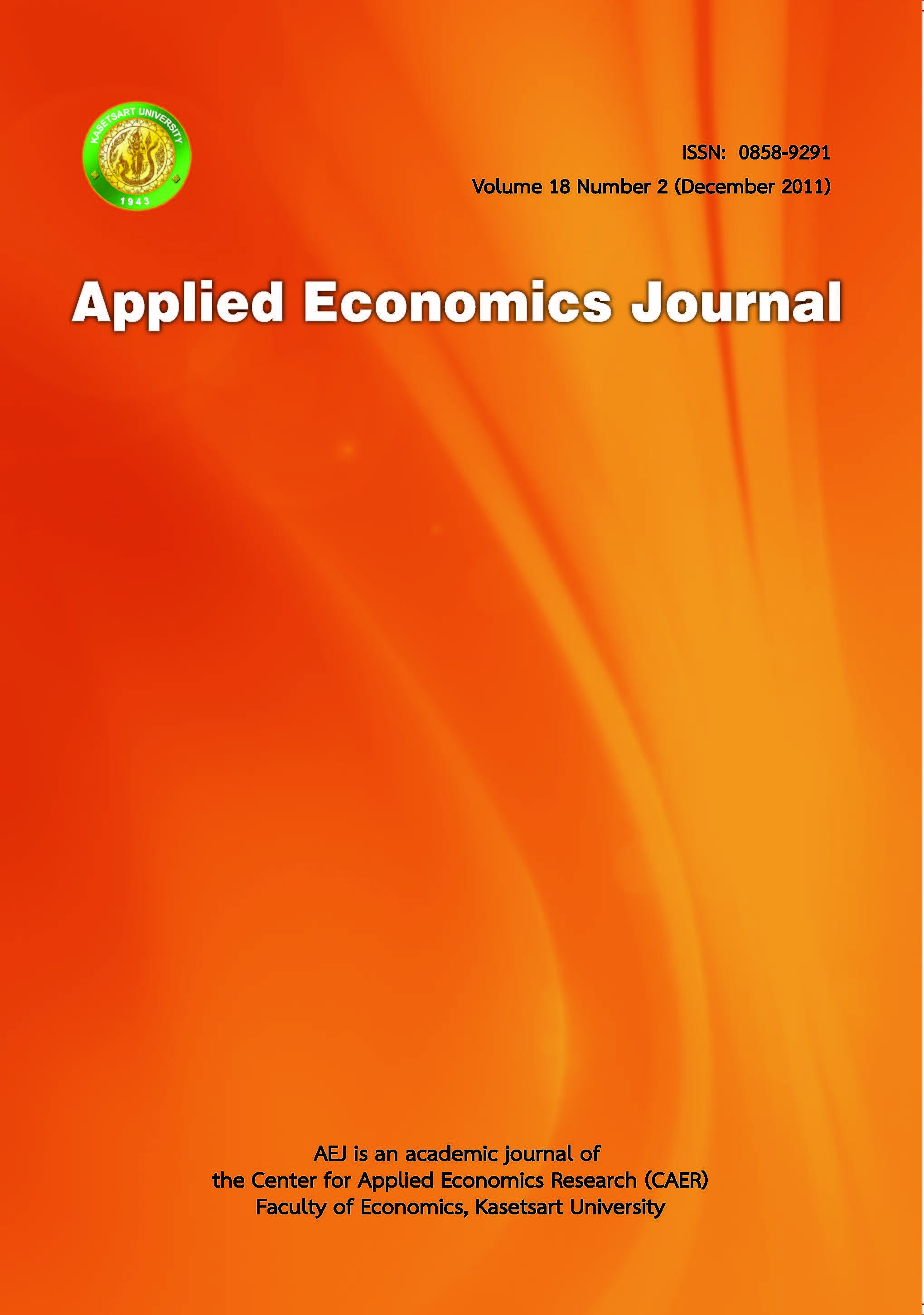ผลกระทบจากเหตุการณ์วิกฤตที่มีต่ออุปสงค์ของนักท่องเที่ยวต่างชาติของไทย
Main Article Content
Abstract
บทคัดย่อ
การศึกษานี้ประเมินจำนวนนักท่องเที่ยวต่างชาติของไทยที่ลดลงจากเหตุการณ์วิกฤตสำคัญ 9 เหตุการณ์ที่เกิดขึ้นในปี พ.ศ. 2544-2552 โดยประยุกต์แบบจำลอง SARIMA with intervention และ X-12-ARIMA ผลการศึกษา พบว่า วิกฤตแต่ละเหตุการณ์มีผลกระทบต่อตลาดนักท่องเที่ยวต่างชาติแตกต่างกัน ขึ้นอยู่กับช่วงเวลาของการเกิด ประเภทของวิกฤต และตลาดนักท่องเที่ยว โดยวิกฤตจากการแพร่ระบาดของโรคสร้างความเสียหายมากกว่าเหตุการณ์อื่น แต่มีแนวโน้มความเสียหายลดลงหากเกิดเหตุการณ์ดังกล่าวซ้ำอีก ขณะที่วิกฤตจากความวุ่นวายภายในประเทศมีผลกระทบน้อยในครั้งแรก แต่มีแนวโน้มผลกระทบเพิ่มขึ้นหากเกิดอีกในอนาคต ส่วนเหตุการณ์จากสึนามิมีผลกระทบมากต่ออุปสงค์การท่องเที่ยวไทย แต่อุปสงค์ฟื้นตัวกลับได้เร็วกว่าเหตุการณ์อื่น ส่วนเหตุการณ์ 9/11 มีผลกระทบน้อยต่อการท่องเที่ยวไทย ประเทศไทยควรให้ความสำคัญกับการแก้ไขปัญหาความวุ่นวายภายในประเทศเป็นอันดับแรก และมาตรการแก้ไขปัญหาการท่องเที่ยวควรสอดคล้องกับลักษณะความอ่อนไหวต่อเหตุการณ์วิกฤตของแต่ละตลาดนักท่องเที่ยวซึ่งมีความแตกต่างกัน
คำสำคัญ : เหตุการณ์วิกฤต, อุปสงค์ของนักท่องเที่ยวต่างชาติ, แบบจำลอง SARIMA, แบบจำลอง Intervention
Abstract
This study assesses the impacts of nine major crisis events during 2001-2009 on the number of foreign tourists in Thailand. The SARIMA with intervention models and X-12-ARIMAare applied. The results show that each crisis had a different effect on the number of tourists depending on the duration of situation, type of crisis, and country of origin. The disease outbreaks had a greater impact than the other crises, but the degree of impact was likely to decrease should a similar outbreak occurs. In contrast, the impact from the internal political chaos was relatively small when it occurred for the first time, but would be greater if it recurred. The Indian Ocean Tsunami of 2004 had a huge impact but recovery was faster than that of other crises. The 9/11 event made a minimal impact on Thai tourism. Based on the results, it is suggested that solving the internal politics should be the firstpriority if government aims to enhance Thailand’s tourism industry. In addition, the measures used for solving crises should be designed to fit each foreign tourist markets’ diverse responsiveness.
Keywords : crisis events, international tourism demand, SARIMA, intervention models
JEL Classification : C01, C19, C22, C59
Article Details
The paper is published under CC BY-NC-ND, in which the article is freely downloaded and shared in its original form non-commercially and its citation details are identified.


